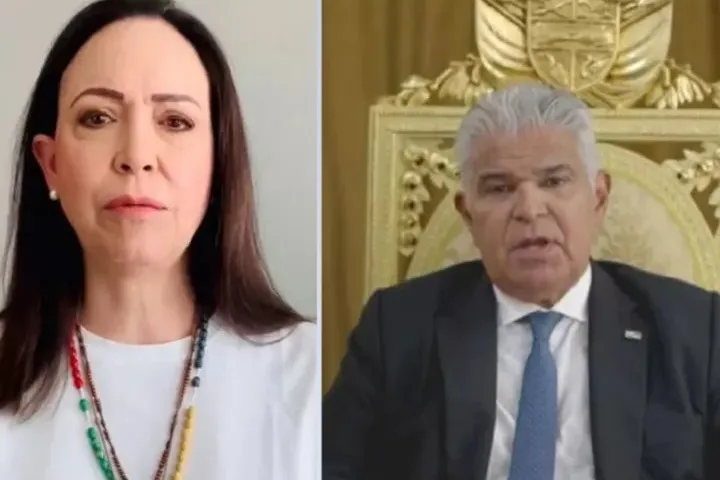In a significant show of international support, the president of Panama, José Raúl Mulino, publicly congratulated Venezuelan opposition leader María Corina Machado for being awarded the 2025 Nobel Peace Prize. This prestigious recognition shines a global spotlight on the ongoing struggle for democracy and human rights in Venezuela, drawing supportive reactions from world leaders and dignitaries. The award underscores the power of peaceful, persistent advocacy in the face of authoritarian regimes.
Panamanian Leadership Applauds a Champion for Democracy
President Mulino’s endorsement was swift and unequivocal. Taking to his social media accounts, the Panamanian leader expressed the collective sentiment of the nation. He stated, “On behalf of panama and all Panamanians, we congratulate the designation of @MariaCorinaYA as the 2025 Nobel Peace Prize Laureate. Without a doubt, it is a recognition of her peaceful struggle at the head of a people fighting for their freedom. A great triumph!”
This public support from a sitting head of state is more than a diplomatic gesture; it is a powerful alignment with democratic principles. Panama itself has a deep-rooted history of defending its sovereignty, most famously through the Panama Canal treaties. By honoring Machado, President Mulino reinforces Panama’s role as a regional advocate for freedom and self-determination.
Historic Praise from Panama’s First Female President
Adding considerable weight to the chorus of acclaim, former Panamanian President Mireya Moscoso also lauded María Corina Machado’s achievement. Moscoso, who made history as the first woman to lead Panama from 1999 to 2004, released a public statement highlighting the personal and political significance of the award.
“As a woman and a Panamanian who has closely witnessed María Corina’s courage, bravery, and perseverance, I value this award as recognition of her cause: democracy in Venezuela,” Moscoso stated. Her perspective is particularly poignant, given her own legacy as a female leader in Latin America and her longstanding criticism of authoritarianism in the region.
Why Did María Corina Machado Win the Nobel Peace Prize?
The Norwegian Nobel Committee in Oslo made the official announcement, recognizing Machado for her extraordinary and non-violent efforts. According to the committee’s official citation, she was honored “for her tireless work in promoting the democratic rights of the Venezuelan people and for her struggle to achieve a just and peaceful transition from dictatorship to democracy.”
A Life of Sacrifice and Inspiration
The Nobel Institute’s announcement shed light on the immense personal sacrifices Machado has made. They highlighted that the opposition leader “has been forced to live in hiding” since 2024. Despite grave threats to her personal safety, “she has remained in the country, a decision that has inspired millions of people.” This commitment to standing with her fellow citizens, even at great personal risk, exemplifies the courage the Peace Prize seeks to honor.
Unifying a Fractured Opposition
Another critical factor in the committee’s decision was Machado’s pivotal role in consolidating Venezuela’s opposition forces. In a nation that has been under the rule of Nicolás Maduro since 2012, political fragmentation has been a significant challenge. The committee noted that Machado “has never hesitated to resist the militarization of Venezuelan society and has remained steadfast in her support for a peaceful transition to democracy.” Her work has been instrumental in maintaining a cohesive, non-violent movement aimed at restoring democratic governance.
The Significance of the Award for Venezuela and the World
María Corina Machado’s Nobel Peace Prize is not just a personal triumph; it is a landmark event with profound implications.
- First Venezuelan Laureate: Machado becomes the first Venezuelan national in history to receive the Nobel Peace Prize, placing her country’s struggle on the world stage like never before.
- Validation of Peaceful Resistance: In a region sometimes marred by political violence, the award validates the power and moral authority of peaceful, democratic opposition.
- Increased International Scrutiny: The global recognition brings renewed international attention and pressure on the Maduro regime regarding its human rights record and democratic processes.
The situation in Venezuela remains one of the most severe humanitarian and political crises in the Western Hemisphere. According to a 2024 report by the UN Refugee Agency (UNHCR), over 7 million Venezuelans have fled the country due to political turmoil, economic collapse, and human rights concerns.
Frequently Asked Questions About the 2025 Nobel Peace Prize
Who is María Corina Machado?
María Corina Machado is a Venezuelan political leader, former legislator, and long-standing opposition figure. She is known for her unwavering commitment to democratic principles and her peaceful advocacy for a political transition in Venezuela.
What is the Nobel Committee’s reason for choosing her?
The committee specifically cited her “tireless work in promoting the democratic rights of the Venezuelan people” and her struggle for a “just and peaceful transition from dictatorship to democracy.”
Why is international support, like that from Panama’s presidents, important?
Support from international figures like Presidents Mulino and Moscoso provides crucial moral and diplomatic legitimacy to Machado’s cause. It helps isolate authoritarian regimes and demonstrates that the fight for democracy in Venezuela is being watched and supported globally.
The congratulatory messages from Panama’s current and former leaders are a powerful testament to the international resonance of María Corina Machado’s work. Her 2025 Nobel Peace Prize serves as a beacon of hope, not only for Venezuelans but for all people striving for freedom and justice worldwide.



